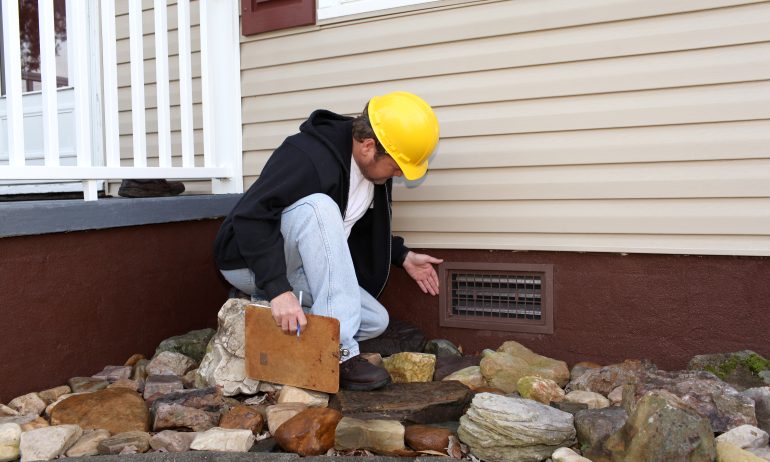What Is an Elevation Certificate?
Getting a FEMA elevation certificate may help you qualify for lower flood insurance rates.

Many, or all, of the products featured on this page are from our advertising partners who compensate us when you take certain actions on our website or click to take an action on their website. However, this does not influence our evaluations. Our opinions are our own. Here is a list of our partners and here's how we make money.
An elevation certificate shows how high your home sits relative to anticipated flooding.
Having an elevation certificate may help you qualify for lower flood insurance premiums.
An elevation certificate may cost anywhere from $170 to more than $2,000.
An elevation certificate tells insurers exactly how high your home is compared to known flood levels in your area. Having one can potentially save you money on flood insurance.
What is an elevation certificate?
An elevation certificate (EC) provides details about your home's elevation relative to the estimated height of floodwaters in your area. Flood insurance companies use this certificate to assess your flood risk and set your premiums.
A land surveyor or engineer typically prepares the elevation certificate. It includes things like your property address, the elevation of your lowest floor and the elevation range of the ground around your property. This information helps determine if your home is above or below the local Base Flood Elevation (BFE).
The BFE is the elevation that floodwaters are expected to have a 1% chance of reaching each year, according to the Federal Emergency Management Agency. The logic is simple: The higher your home is above the BFE, the lower your risk of flooding.
Is an elevation certificate required?
Before April 2023, some homeowners had to get an elevation certificate when buying a flood insurance policy through the National Flood Insurance Program. The NFIP no longer requires elevation certificates. However, you may still want to get one to see if it will help you qualify for cheaper flood insurance.
When you might need an elevation certificate
Here are a few situations in which you might want or need an elevation certificate.
Lowering your flood insurance rate
Without an elevation certificate, your flood insurance provider will rely on general datasets to estimate your flood risk, including factors like your home's distance from water sources and how much it would cost to rebuild.
An elevation certificate can offer more detailed information about your home. If it shows that your property is at less risk than your insurer thought, you could qualify for a lower flood insurance rate.
Eliminating your flood insurance requirement
If you have a government-backed mortgage and live in a Special Flood Hazard Area (a high-risk flood zone as defined by FEMA), you’re probably required to buy flood insurance. But what if you don’t agree that your home is at high risk? You may be able to use an elevation certificate to challenge your home’s SFHA designation.
A Special Flood Hazard Area has a 1% chance of flooding each year. To find out which flood zone your house is in, visit FEMA’s flood map service center.
You can file a Letter of Map Change request with FEMA online. You’ll typically need to provide an elevation certificate from a professional land surveyor or engineer to help make your case.
If FEMA removes your home from the SFHA, your mortgage lender may no longer require you to buy flood insurance.
Building or renovating
If you're building or renovating a home in a flood-prone area, local building codes might require you to have an elevation certificate. This ensures your new or improved home complies with the area's floodplain management rules.
How to get an elevation certificate
To get an elevation certificate, start by contacting your local floodplain manager. Depending on where you live, you may need to contact your municipal, county or state government to find the right person. The floodplain manager might already have an EC on file for your property.
Sometimes, an EC is included in your property’s deed or other real estate documents. Check these sources, especially if your home is in a high-risk flood area.
If you recently bought your property, the previous owners or the developer might have gotten an EC when it was built. Reach out and ask if they can provide a copy.
If the above steps don’t yield results, you can hire a licensed land surveyor, professional engineer or certified architect. These professionals are authorized to certify elevation information and can complete an EC for your property for a fee.
How much does a flood elevation certificate cost?
On average, homeowners can expect to pay $600 for a flood elevation certificate, according to data collected by HomeAdvisor. But your price may range from $170 to $2,000 or more depending on your location, property size and terrain challenges.
Getting quotes from several professionals can help you find the best rate. Keep in mind that investing in an EC could potentially save you money on flood insurance premiums. So even if you have to pay for it upfront, it could be worth it over time.
What to do with an elevation certificate
Share your flood elevation certificate with your flood insurance provider to see if it can lower your premiums. Store the original certificate in a safe place with other property documents, such as your deed and home insurance policy. Having it easily accessible can help if you need to reference it quickly.
You can keep your EC indefinitely. Elevation certificates don’t expire unless there are changes to the building that would invalidate information on the original document.
ON THIS PAGE
ON THIS PAGE

